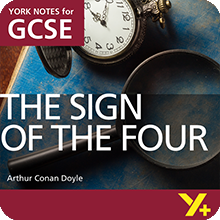Examiner's Notes
You assessed this answer as a Mid.
Hover over the highlighted text to read the examiner’s comments.
- in this extract?
- in the novella as a whole?
Sherlock Holmes seems very unique to us because he wants to do work which is difficult and problematic, ‘Give me problems, give me work...’. He likes a challenge and he says he gets bored very easily otherwise.
He is also unique in that he has invented his own profession and even he thinks he is one of a kind, ‘The only unofficial consulting detective’. This suggests it was very unusual at the time for someone to work in the way that Holmes does.
It is also unusual to not want any reward or recognition for what you do but Holmes says that, ‘The work itself, the pleasure of finding a field for my peculiar powers, is my highest reward.’ This suggests that it is solving the cases that is the main reward for Holmes, like a kind of personal challenge. The word ‘peculiar’ suggests that Holmes himself thinks he is quite unique.
However, Holmes is also quite critical. When he is talking to Watson he says, ‘I cannot congratulate you on it.’ This suggests he is not happy with the way Watson has presented one of his cases in his story.
In other places in the novella, we know Holmes is critical of others too. For example when he is talking about the police and Athelney Jones. This suggests he does not have a high opinion of them. He is not unkind though as he says, ‘He is not a bad fellow ...’ about Jones.
We find out more in the novella about his methods of work. He tends to use analysis and logic to solve cases like a puzzle. He also uses close examination and takes a scientific approach. We see this in the way he examines the crime scene at Pondicherry Lodge. The nineteenth century was a time when scientific knowledge expanded rapidly and Holmes uses it to his advantage.
Holmes is presented as being clever and we know this when Conan Doyle describes him using phrases like, ‘extraordinary concentration’ and ‘hawk-like features’. Watson also gives his view of Holmes and tells us, ‘Holmes alone could rise superior to petty influences.’ This suggests ordinary things do not distract him.
It seems that Holmes is very knowledgeable, he has a good memory and many skills such as we see when he thinks about past cases, refers to his books and climbs on the roof to gather more evidence. He uses all of his skills in his work, and he is also very inventive in his methods. For example he wears a disguise when he needs to find the Aurora, and he uses his many contacts and his reputation to gather clues as the novella develops.
